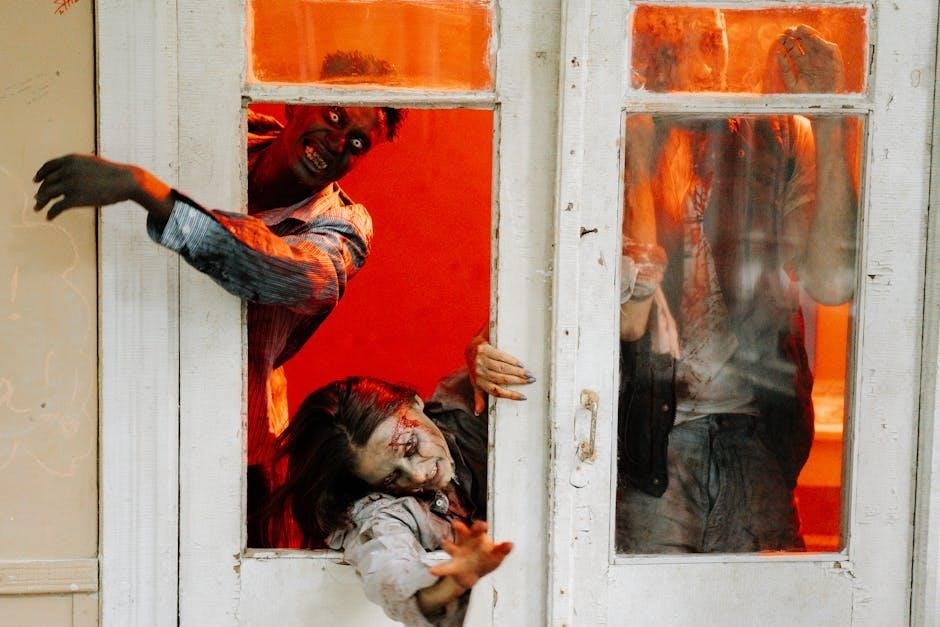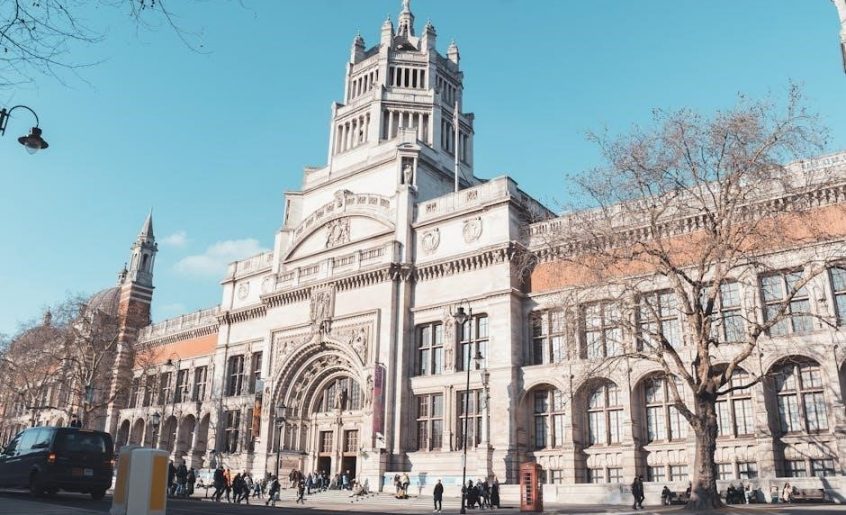Albert Camus’ The Plague is a timeless novel exploring human resilience‚ absurdism‚ and solidarity amidst crisis․ Written during WWII‚ it mirrors the COVID-19 pandemic’s challenges‚ offering universal lessons on empathy and hope․ Available as a PDF‚ it remains a vital read for understanding adversity’s philosophical depths․
Background and Publication
Written during WWII‚ Albert Camus’ The Plague was first published in 1947 in French as La Peste․ The novel was later translated into English by Stuart Gilbert in 1948‚ becoming a cornerstone of 20th-century literature․ Reflecting Camus’ transition from absurdism to rebellion‚ it allegorizes the French Resistance’s struggle․ The PDF version‚ part of the Modern Library collection‚ is widely available‚ offering readers a profound exploration of human resilience and existential themes during crises‚ resonating deeply with contemporary challenges like the COVID-19 pandemic․
Relevance of the Novel in Modern Context
The Plague remains strikingly relevant today‚ offering insights into human behavior during crises like the COVID-19 pandemic․ Camus’ exploration of empathy‚ solidarity‚ and absurdism resonates deeply‚ encouraging readers to reflect on resilience and morality․ The novel’s themes of isolation and collective response mirror modern challenges‚ making it a timeless guide for navigating adversity․ Its availability as a PDF ensures accessibility‚ allowing new generations to engage with its universal lessons on hope and humanity’s struggle against suffering․

Historical Context of the Novel
The Plague‚ written by Albert Camus and published in 1947‚ is set in Oran‚ Algeria‚ during a fictional outbreak․ Drawing inspiration from historical plagues and WWII‚ the novel reflects Camus’ experiences with absurdism and rebellion‚ offering a profound commentary on human resilience and moral struggle during crises․
The Plague as an Allegory for the French Resistance
Albert Camus’ The Plague serves as a powerful allegory for the French Resistance during WWII․ The novel‚ set in Oran‚ uses the plague as a metaphor for Nazi occupation‚ symbolizing oppression and collective suffering․ Camus‚ deeply involved with the Resistance‚ crafted the story to reflect the moral and physical struggles of fighting against tyranny; The characters’ resilience and solidarity mirror the courage of Resistance fighters‚ while the plague itself embodies the oppressive forces they sought to overcome․ This allegorical layer underscores Camus’ philosophical transition from absurdism to rebellion‚ highlighting the necessity of human defiance against injustice․
Camus’ Transition from Absurdism to Rebellion
In The Plague‚ Albert Camus shifts his philosophical focus from absurdism to rebellion․ While earlier works like The Myth of Sisyphus explored the meaninglessness of life‚ The Plague introduces a new dimension: collective resistance․ Through characters like Dr․ Rieux‚ Camus emphasizes the importance of moral action and solidarity in the face of suffering․ This transition reflects his personal involvement with the French Resistance‚ blending existentialist thought with a call for ethical engagement and defiance against oppression‚ marking a significant evolution in his philosophical perspective․

Themes and Philosophy in “The Plague”
The Plague by Albert Camus explores themes of empathy‚ solidarity‚ and the absurd‚ delving into human suffering and the search for meaning amidst crisis‚ blending philosophy with profound insight․
Empathy and Solidarity in the Face of Adversity
In The Plague‚ Camus underscores the power of empathy and solidarity as humans confront suffering․ Dr․ Rieux and Jean Tarrou embody selfless compassion‚ inspiring collective resilience․ The novel highlights how shared adversity fosters unity‚ transcending individualism․ Through their actions‚ Camus illustrates that true strength lies in communal support and kindness‚ offering timeless lessons on humanity’s capacity to persevere together in crisis․ This theme remains central to the novel’s enduring relevance‚ echoing across generations and crises․
Absurdism and the Meaning of Suffering
The Plague reflects Camus’ exploration of absurdism‚ where suffering challenges humanity’s quest for meaning․ The novel portrays a seemingly indifferent universe‚ with the plague’s randomness defying rational explanation․ Through Dr․ Rieux’s unwavering commitment to his duty‚ Camus suggests that meaning is found not in understanding suffering but in confronting it with courage and compassion․ This philosophical framework underscores the novel’s enduring relevance‚ offering a profound meditation on the human condition amidst absurdity and despair․
The Struggle Between Hope and Despair
In The Plague‚ Camus masterfully depictsthe tension between hope and despair․ Amidst the devastation‚ characters like Dr․ Rieux embody resilience‚ while others‚ like Father Paneloux‚ grapple with existential despair․ Camus illustrates that hope is not an absence of despair but a choice to act with dignity and compassion despite suffering․ This struggle is central to the novel’s message‚ emphasizing the human capacity to find meaning even in the bleakest circumstances‚ resonating deeply with readers in any era of crisis․

Psychological and Social Impact of the Plague
The plague unleashes widespread fear‚ anxiety‚ and social disintegration‚ isolating individuals and eroding trust․ Camus vividly portrays how collective trauma reshapes human behavior and societal norms․
Normalcy Bias and Human Reaction to Crisis
In The Plague‚ Camus illustrates how normalcy bias delays collective action during crises․ The citizens of Oran initially downplay the outbreak‚ reflecting humanity’s tendency to deny impending disaster․ This psychological phenomenon highlights the tension between complacency and reality‚ as individuals struggle to confront the absurdity of their situation․ Camus’ portrayal underscores the universal human inclination to cling to routine‚ even when faced with existential threats․
The Role of Isolation and Quarantine
In The Plague‚ isolation and quarantine serve as both necessary measures and sources of profound psychological strain․ The separation from loved ones and the loss of normalcy create a sense of existential despair․ Camus explores how these measures‚ while crucial for containing the outbreak‚ also reveal the fragility of human connections and the individual’s struggle to maintain hope in the face of enforced solitude․
Modern Relevance and Parallels
The Plague mirrors contemporary crises‚ such as the COVID-19 pandemic‚ highlighting universal themes of resilience‚ solidarity‚ and the human condition in the face of catastrophe․
Comparisons with the COVID-19 Pandemic
Albert Camus’ The Plague resonates deeply with the COVID-19 pandemic‚ as both events highlight human resilience‚ fear‚ and solidarity․ The novel’s depiction of isolation‚ normalcy bias‚ and collective suffering mirrors modern experiences․ Themes of empathy‚ hope‚ and the absurd align with global responses to the virus․ Camus’ exploration of societal breakdown and moral courage offers timeless insights‚ making The Plague a poignant reflection of humanity’s universal struggles during crises․
Universal Lessons for Humanity
The Plague by Albert Camus offers enduring lessons on resilience‚ solidarity‚ and humanity’s capacity to confront suffering․ The novel underscores the importance of empathy‚ collective action‚ and moral courage in the face of adversity․ Camus’ exploration of universal themes like hope‚ despair‚ and the absurd provides profound insights into the human condition‚ making the story a timeless reflection on our shared struggles and strengths․ Its relevance transcends time‚ inspiring readers to find meaning in crisis․

Key Characters and Their Roles
Dr․ Bernard Rieux and Jean Tarrou are central figures‚ embodying moral courage and the struggle against absurdity․ Their roles highlight solidarity‚ sacrifice‚ and humanity’s resilience in crisis․
Dr․ Bernard Rieux and His Moral Courage
Dr․ Bernard Rieux is the embodiment of moral courage in The Plague․ As a physician‚ he dedicates himself to combating the outbreak‚ showing unwavering commitment to his duty․ His selflessness and refusal to flee exemplify a profound sense of responsibility․ Rieux’s character symbolizes resilience and the human capacity to act with dignity in the face of absurdity․ His leadership in organizing sanitary groups highlights his role as a moral anchor‚ inspiring others to unite against despair․ Through his actions‚ Camus portrays a hero who finds meaning in service‚ not heroism․
Jean Tarrou and the Concept of Innocent Murderer
Jean Tarrou‚ a mysterious figure in The Plague‚ embodies the concept of the “innocent murderer․” Haunted by his past as a political killer‚ he seeks redemption through selfless acts during the epidemic․ His diary reveals a journey from moral ambiguity to clarity‚ as he joins Dr․ Rieux in combating the plague․ Tarrou’s character highlights the tension between guilt and redemption‚ illustrating Camus’ exploration of human complexity and the struggle for meaning in the face of suffering and absurdity․
Philosophical and Literary Analysis
Albert Camus’ The Plague explores absurdism and existentialism‚ delving into human suffering and resilience․ His writing style‚ blending philosophical depth with vivid storytelling‚ has profoundly influenced modern literature‚ emphasizing themes of hope amidst despair and the search for meaning in chaos․
The Absurd Man in the Midst of the Plague
In The Plague‚ Albert Camus embodies the concept of the “absurd man” through characters like Dr․ Bernard Rieux‚ who persists in his futile efforts to combat the plague․ This reflects Camus’ philosophy of absurdism‚ where individuals confront a meaningless world with dignity and resilience․ The novel explores the tension between humanity’s search for purpose and the indifferent universe‚ highlighting themes of rebellion and solidarity in the face of existential despair․ The absurd man finds meaning in the struggle itself‚ not in its outcome․
Camus’ Writing Style and Its Influence
Albert Camus’ writing style in The Plague is marked by clarity‚ simplicity‚ and moral depth‚ creating a sense of immediacy and universality․ His prose avoids embellishment‚ reflecting his belief in the absurd‚ where life’s meaning is found in its inherent contradictions․ This style has deeply influenced existentialist literature and philosophical thought‚ inspiring writers to explore themes of resilience and rebellion․ Camus’ work remains a cornerstone of modern literary philosophy‚ continuing to resonate with readers in its PDF and other formats․
Availability and Downloads
The Plague by Albert Camus is widely available as a PDF‚ with versions accessible on platforms like ResearchGate and Scribd․ The file size typically ranges from 8-40 MB․
PDF Versions and Online Resources
Translations and Editions of the Novel
The Plague is available in various translations‚ with notable versions by Stuart Gilbert and Robin Buss․ Published by Modern Library and Vintage‚ editions from 1948 and 1964 are widely circulated․ The novel has been translated into multiple languages‚ including French‚ and is accessible in digital formats․ ISBNs for different editions vary‚ ensuring accessibility across regions․ Fans can explore these translations on platforms like Scribd or through academic resources‚ making Camus’ timeless work globally accessible․
Legacy and Cultural Impact
The Plague stands as a timeless classic‚ influencing contemporary literature and thought․ Its exploration of human resilience and absurdism continues to resonate‚ making it a cornerstone of modern philosophy and culture․ The novel’s themes transcend generations‚ solidifying Camus’ legacy as a profound thinker and writer․ Its availability in PDF ensures global accessibility‚ further cementing its cultural impact and enduring relevance․
The Plague as a Timeless Classic
Albert Camus’ The Plague remains a timeless classic‚ resonating across generations with its profound exploration of human resilience‚ absurdism‚ and solidarity․ Its themes of empathy and struggle against adversity transcend time‚ offering universal lessons․ The novel’s relevance during crises‚ such as the COVID-19 pandemic‚ underscores its enduring significance․ As a PDF‚ it continues to inspire readers globally‚ solidifying its place as a cornerstone of modern philosophical and literary thought․
Its Influence on Contemporary Literature
The Plague by Albert Camus has profoundly influenced contemporary literature‚ inspiring authors to explore existential and philosophical themes․ Its depiction of societal responses to crises has shaped modern narratives on pandemics and human behavior․ The novel’s emphasis on empathy and moral courage continues to resonate‚ making it a benchmark for writers addressing global challenges․ Available as a PDF‚ its legacy endures‚ fostering new works that reflect on humanity’s collective struggles and resilience․
The Plague by Albert Camus remains a profound exploration of humanity’s resilience and moral courage․ Its timeless themes and philosophical depth continue to resonate‚ offering insights into crisis and hope․ Available as a PDF‚ it stands as a enduring reflection on the human condition and our collective struggle against adversity․
Final Thoughts on the Novel’s Significance
The Plague by Albert Camus is a profound exploration of human resilience‚ moral courage‚ and the search for meaning in suffering․ Through its vivid portrayal of a town gripped by an epidemic‚ Camus underscores the importance of empathy and solidarity․ The novel’s timeless themes resonate deeply‚ offering insights into the human condition and our collective struggle against adversity․ Its relevance extends beyond historical context‚ making it a vital read for understanding crisis and hope․ Available as a PDF‚ it continues to inspire reflection on humanity’s enduring spirit․
